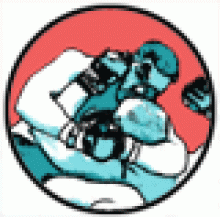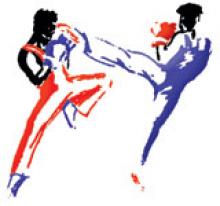Classes
|
Bruce Lee researched and experimented with methods from many systems of martial arts, using the essence of these arts in their given ranges. The methods had to be practical and economical, with no wasted motion. Some of the arts he drew from are: Wing Chun kung fu, boxing, fencing, Savate, Tai Chi Chuan and Jujitsu. We teach Bruce Lee's original authentic curriculum and training methods from 1964-1973, as passed down to us from Sifu Dan Inosanto, heir to Jeet Kune Do and the only person ever given 3rd rank (instructor level) in Jeet Kune Do personally by Bruce Lee. |
|
At Princeton Academy of Martial Arts, we teach both the Inosanto method of Filipino Kali and Lameco Eskrima. The Inosanto method, taught to us by Guro Dan Inosanto, is a system developed by Guro Inosanto based on his many years of study with over 25 different Filipino masters in Kali/Eskrima. Lameco Eskrima, founded in 1981 by Punong Guro Edgar Sulite, uses long, middle and close range weaponry and is based on ten systems he studied in the Philippines. |
|
|
|
|
|
Maphilindo Silat was founded by Guro Dan Inosanto, and is based on the various systems of Silat he has studied under Silat masters from Malaysia, the Philippines and Indonesia. Maphilindo combines these Silat styles, using empty hand strikes, off-balancing, kicks, punches, elbows, knees and nerve strikes. Guro Inosanto created this system to honor his Silat instructors. Mande Muda Pencak Silat is a family system of Silat headed by Pendekar Herman Suwanda of Indonesia. Founded in 1953 by Herman Suwanda's father, Mande Muda Pencak Silat is a combination of 24 systems of Indonesian Silat, including Tjimande, Tjikalong, Harimau and Kari. With Mande Muda you learn to defend yourself while standing or from the ground, and how to effectively use kicks, hand strikes, elbows, knees, nerve hits and locks. Pentjak Silat Bukti Negara, founded by Pendekar Paul De Thouars in 1984, uses quick entries and close-quarter strikes with the hands, elbows and knees. Based on the principles of Serak, Bukti Negara also emphasizes the use of levers for off-balancing, sweeps and throws. Because this system is based on body physics rather than brute strength, it can be used by anyone, regardless of size or strength. |
|
The training itself is a great workout and develops physical and mental conditioning, toughness and a "keep-going" attitude. The instructors at Princeton Academy of Martial Arts are certified by Ajarn Chai Sirisute, founder of the Thai Boxing Association of the USA. Ajarn Chai is the first-ever Thai boxing instructor to teach Americans this art. |
|
Call today to sign your child up for a free trial class. You will be amazed by a child's desire to cultivate all these invaluable skills! |

 Jeet Kune Do/Jun Fan Gung Fu is the training methods and techniques originally developed by Bruce Lee. Jeet Kune Do incorporates four ranges of defense: kicking, punching, trapping hands, and joint locking/grappling. Use of four ranges is unique - most styles practice only one or two ranges.
Jeet Kune Do/Jun Fan Gung Fu is the training methods and techniques originally developed by Bruce Lee. Jeet Kune Do incorporates four ranges of defense: kicking, punching, trapping hands, and joint locking/grappling. Use of four ranges is unique - most styles practice only one or two ranges. Kali is one of the most highly efficient and sophisticated weapons and empty-hands systems from the Philippines. Known mainly for its use and defense of weapons, Kali consists of twelve areas, including some of the most complete and effective empty-hands systems of the martial arts. Besides excelling as a realistic self-defense system, Kali - through its use of weaponry - also develops attributes such as speed, agility, timing, body mechanics, and left and right side neuromuscular coordination.
Kali is one of the most highly efficient and sophisticated weapons and empty-hands systems from the Philippines. Known mainly for its use and defense of weapons, Kali consists of twelve areas, including some of the most complete and effective empty-hands systems of the martial arts. Besides excelling as a realistic self-defense system, Kali - through its use of weaponry - also develops attributes such as speed, agility, timing, body mechanics, and left and right side neuromuscular coordination. The grappling taught at Princeton Academy of Martial Arts is a combination of different arts, all of which emphasize ground work. Body positioning and sensitivity, takedowns, submissions, lock flows, ground mobility, and conditioning are covered in the grappling classes. Some of the grappling arts that are used in the grappling curriculum are Brazilian Machado Jiu Jitsu, Filipino groundfighting, Shoot Wrestling and Silat.
The grappling taught at Princeton Academy of Martial Arts is a combination of different arts, all of which emphasize ground work. Body positioning and sensitivity, takedowns, submissions, lock flows, ground mobility, and conditioning are covered in the grappling classes. Some of the grappling arts that are used in the grappling curriculum are Brazilian Machado Jiu Jitsu, Filipino groundfighting, Shoot Wrestling and Silat. Savate, which literally means 'old shoe', is the only kickboxing style that uses shoes in the ring. The shoe becomes a weapon for the fighter to use against his opponent. This system of fighting was born in the streets of France and evolved to become a very sophisticated system of self-defense. It was the most popular fighting art in Europe up to the beginning of the century. Unfortunately World War I and II claimed the lives of many masters and students. But Savate rose from the ashes and flourished once again. It now takes its place as one of the most popular and complete fighting systems in the world. Its history, its masters and champions past and present give Savate its unique flavor not found anywhere else.
Savate, which literally means 'old shoe', is the only kickboxing style that uses shoes in the ring. The shoe becomes a weapon for the fighter to use against his opponent. This system of fighting was born in the streets of France and evolved to become a very sophisticated system of self-defense. It was the most popular fighting art in Europe up to the beginning of the century. Unfortunately World War I and II claimed the lives of many masters and students. But Savate rose from the ashes and flourished once again. It now takes its place as one of the most popular and complete fighting systems in the world. Its history, its masters and champions past and present give Savate its unique flavor not found anywhere else. There are hundreds of systems of Silat found in Indonesia, Malaysia and the Southern Philippines. These arts were designed for survival in real combat, not for sport or tournaments. Some Silat systems specialize in close-quarter combat from a standing position, while others specialize in ground fighting, taking the attacker to the ground and using strikes, pressure points and locks. Many Silat systems are designed for multiple opponents, moving quickly from one opponent to another, or simultaneously defending against more than one opponent. Princeton Academy of Martial Arts' Silat curriculum consists of Maphilindo Silat, Mande Muda Pencak Silat and Pentjak Silat Bukti Negara
There are hundreds of systems of Silat found in Indonesia, Malaysia and the Southern Philippines. These arts were designed for survival in real combat, not for sport or tournaments. Some Silat systems specialize in close-quarter combat from a standing position, while others specialize in ground fighting, taking the attacker to the ground and using strikes, pressure points and locks. Many Silat systems are designed for multiple opponents, moving quickly from one opponent to another, or simultaneously defending against more than one opponent. Princeton Academy of Martial Arts' Silat curriculum consists of Maphilindo Silat, Mande Muda Pencak Silat and Pentjak Silat Bukti Negara Muay Thai, also called Thai Boxing, is the national martial art and sport of Thailand. Many people think of Thai Boxing as only a kickboxing ring sport, but it is much more. Besides proving itself as the toughest ring sport through its use of kicks, punches, elbows, knees and standing grappling, Thai boxing is excellent for street self-defense.
Muay Thai, also called Thai Boxing, is the national martial art and sport of Thailand. Many people think of Thai Boxing as only a kickboxing ring sport, but it is much more. Besides proving itself as the toughest ring sport through its use of kicks, punches, elbows, knees and standing grappling, Thai boxing is excellent for street self-defense. Confidence, Discipline, and Self-Defense are only some of the valuable skills that children will learn in our program. Along with valuable self-defense skills, your chidlren will develop the types of skills and character building that will carry over into all aspects of their lives and help them especially in school! Focus, Respect for Self and for Others, Self-Control, and Perseverance are emphasized and cultivated in every class - teaching martial arts without these values is missing the essence of true martial arts and the warrior spirit. And of course, kids will have a ton of fun! Classes are warm and inviting which let children develop lasting friendships on and off the mat.
Confidence, Discipline, and Self-Defense are only some of the valuable skills that children will learn in our program. Along with valuable self-defense skills, your chidlren will develop the types of skills and character building that will carry over into all aspects of their lives and help them especially in school! Focus, Respect for Self and for Others, Self-Control, and Perseverance are emphasized and cultivated in every class - teaching martial arts without these values is missing the essence of true martial arts and the warrior spirit. And of course, kids will have a ton of fun! Classes are warm and inviting which let children develop lasting friendships on and off the mat.